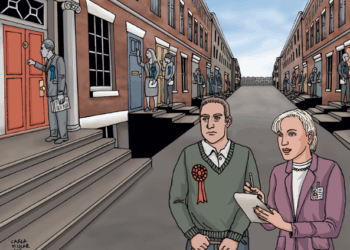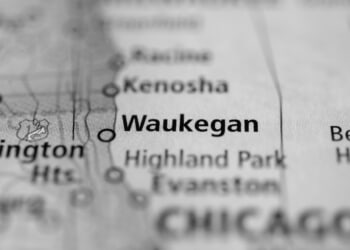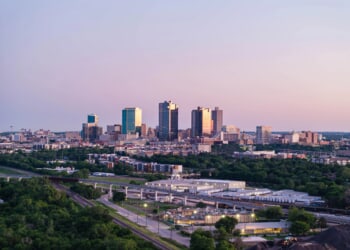Dr Ben Spencer is Shadow Science, Innovation and Technology Minister and member of parliament for Runnymede and Weybridge.
I am proud to be British.
This should never be a controversial statement from a citizen or elected representative. Yet national pride is too often being conflated with an opposition to, or even animosity towards, those who were not born in our country.
As a strong nation we should be proud of our values, history, language and culture, while welcoming those who come to the UK legally to contribute to our way of life. There is nothing paradoxical in this approach – but the key to making it work is to promote a clear understanding of the meaning and value of ‘Britishness’.
I, like many, often hear people talk about the loss of a sense of what it means to be British. A growing feeling of alienation from values and practices which made our country unique.
I know for many this derives from concerns over levels of both legal and illegal immigration, especially where this is compounded by a lack of effective integration. A sense of the powerlessness on the part of leaders and communities to take control of the situation and have honest and open conversations about the best legal immigration policy for our nation and the associated benefits and trade-offs. Too often, these sentiments are inflamed by divisive and partisan messages pushed out by media and online.
So let’s confront the genuine issues at the heart of this debate in need of urgent resolution:
1 – The UK benefits from a skilled workforce, and in a global economy migration of skills and expertise is essential.
Even those profoundly concerned over immigration rarely raise concerns over people who arrive in the country legally and who integrate into our communities and embrace our values, contributing their skills to our economy and society after choosing to make the UK their home. The issue therefore is not whether we welcome new people – which the UK has a proud tradition of across many centuries – but how we can control who we welcome.
Much focus is given to the first part: the processes around securing the UK borders, and ensuring decisions around asylum and migration are in our control as part of a robust skilled migration strategy. But we fail to discuss and plan for what happens after, once people are living here.
And on asylum, while we should provide support to those fleeing persecution, it must be part of a fair and proportionate system. One in which public will be confident that those who have been granted asylum status are the most vulnerable and the most in need of it, and that resources provided do not result in UK families being denied access to essential services. I believe that asylum as a concept has become overused and abused, the threshold for it rendered absurdly low. This needs re-thinking for the 21st century.
2 – We need to place a higher value on all work
Using immigration to fill low paid jobs while we have high youth unemployment feeds a divisive social narrative creating prejudice and resentment.
There are jobs which many of our citizens won’t do, leaving essential parts of our economy reliant on ‘cheap imported labour’. In part, this results from the sneering attitude of a political class towards ‘low-paid, low-skilled’ jobs which has exacerbated this problem. Why would British people take these roles if we denigrate the very work itself? And what message does this send to our citizens who take on these roles who, while proud of their work, see their contribution diminished by politicians and in the media. We can see the effect this is having as increasingly many in our society are unwilling to work, rejecting work they see as inappropriate, demeaning, or beneath them.
The result is that, more and more, through the social and financial devaluation we depend on these roles being filled by foreign labour. What signal does that send as to the value of those individuals and their status in our society, all of which plays into the hands of so called ‘populism’?
3 – Integration needs something to integrate into
Our country is at a crossroads, many feeling bleak and pessimistic for the future of a country no longer united or with clear purpose and pride. It cannot be fixed by technical and process changes in immigration policy. It must be underpinned by bringing society together – rather than seeking to divide – through an understanding of what it means to be British, the values we share and the aims we strive for.
British Citizenship must be given the respect it deserves, rather than reduced to a piece of paper reflecting migration status, given away through a tick box exercise or length of residence. Basic language skills and reciting the date of Magna Carta is insufficient. Citizenship requires a clear and unequivocal demonstration of a commitment to our country and our values, public service, and exacting language proficiency requirements.
If we don’t define what it means to be British, then hostile forces will do it for us in ways that will undermine our country and destroy any prospect of building social cohesion.
It serves no purpose – other than to alienate and divide – to define ‘being British’ by ancient ancestry, race, or religion. This prejudice implicit in such an approach is not reflective of British society’s distinctive tolerance and openness. Rather, British identity needs strong foundations of shared values coupled with a demonstrable commitment to Britain on the part of our citizens.
I am a straight married white man in my mid-forties, born in Liverpool, grandson to a Chindit, catholic, Conservative Member of Parliament, educated at a state grammar, and a former doctor. But first and foremost, I am a British citizen. And while my citizenship derives from my place of birth in the UK to parents who are UK citizens, it is much more than that.
It means that I believe the fundamental British principles of the rule of law, in personal freedoms and responsibility, in promoting and seizing opportunity, in fairness, respect, dignity, tolerance and privacy. I believe in a country which has shown bravery and stoicism in the face of the greatest adversity and doesn’t shy away from doing what is right. I’m proud of our achievements and respect what my family and ancestors did and sacrificed to build and protect our country. I am committed to our future and that of my children who, I hope, in time will do their part for our country and – in time – their own children. It means that I believe in the dream of Britain.
Those seeking citizenship must have a clear understanding of this and all that being British entails so that they can enter into our social contract with a commitment to support both our country and our values. We are all different, and our roles and contributions individual, but our collective commitment to Britain is what should unite us. Whether you choose to make Britain your home for a few years or forever, we should ensure that those who make their lives here commit to share in this vision. This understanding and shared purpose will pave the way to foster effective integration in our communities.
The rewards to the individual of becoming a British citizen are clear, but we ignore the benefits to the country from a clear statement of the duties and expectations of citizens. It would enable us to view migration and work not only through a lens of economic value but also social values and integration, building not just a stronger economy but also a stronger society. As highlighted in my last article, we must value more than just economic contribution from individuals. But we must also measure the value and cost of ensuring integration, and the harms when it does not occur.
With a clear understanding of what it is to be British, and the values and principles that underpin that shared identity, we can reignite pride in our nation. Where we are strong and secure in our own beliefs but also welcome those who share the same ideals and want to build a better future for all of us. Where we do not apologise or diminish our country, but proudly represent and defend our way of life, history and culture. A vaccination against those who seek to weaponise difference for political gain.
I am proud to be British. By defining British values, we can change the narrative, promote social cohesion and work together towards a prosperous future for Britain.








![Donald Trump Slams Chicago Leaders After Train Attack Leaves Woman Critically Burned [WATCH]](https://www.right2024.com/wp-content/uploads/2025/11/Trump-Torches-Powell-at-Investment-Forum-Presses-Scott-Bessent-to-350x250.jpg)








